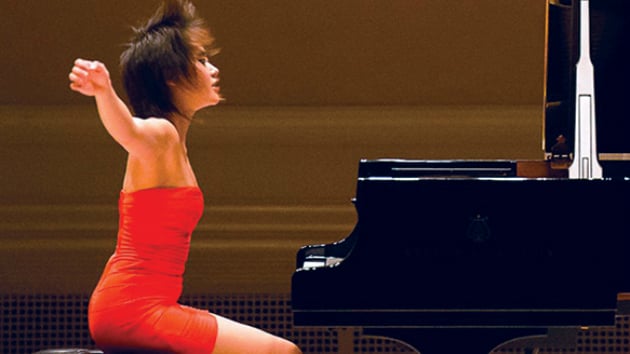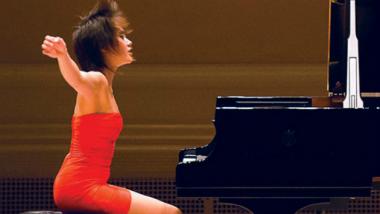
It’s the oddities in life that stand out, as Pierre Salinger wrote, and that was certainly my experience with the Russian National Orchestra concert Sunday, Feb. 21, at Davies Hall. What could have been a thoroughly predictable, all-Russian program—the Festive Overture by Shostakovich, a piano concerto by Tchaikovsky, and Stravinsky’s Firebird—ended up as a set of thoroughly unexpected and pleasurable intervals of interest.
For example, the concerto, interestingly, wasn’t the No. 1 in B-flat Minor, but the No. 2 in G Major, which gets one-tenth the performances of the famous one. Its second movement has such a heartfelt and extended melody for string solos that you’re teleported out of the bravura piano concerto form into the drawing room of a prince’s country estate. You’re eavesdropping on a tryst involving Alexey Bruni’s wonderful violin and Alexander Gotgelf’s equally excellent cello. The piano evaporates. But only for a while.
Yuja Wang was the fleet-fingered soloist for the rest of the concerto. Her technique was flawless in a piece that was as overt and dazzling in the outer movements as you could imagine from this artist. But what struck me about her was not just the superb technique, which, after all, was expected, but also the height of her fingers above the keyboard while executing it. Because the outer movements are rife with treacherous up-and-down-the-keyboard parallel octaves, the high fingers become a far more apparent and crowd-wowing blur. Witnessing it is so jaw-dropping that you are thankfully distracted from the underlying musical vacuity of so many of the passages.
[Yuja Wang's] technique was flawless in a piece that was as overt and dazzling in the outer movements as you could imagine from this artist.
The conductor, Mikhail Pletnev, founder of the orchestra more than 25 years ago, seems telepathically connected to his players. No need to wave his arms, except for the audience, now and then. Simply staring or flicking a finger at the right time here and there seems to work wonders with the crew. The RNO is so well-rehearsed, the rest becomes history.
Besides Wang, there was another, non-Russian, insertion, the premiere of Gretchen to Faust by local composer Gordon Getty, a long-time supporter of the orchestra (and co-founder of SFCV.) The six-minute setting for soprano and orchestra, adapted from Goethe by the composer, is a somber experience dedicated to the memory of Getty’s troubled son Andrew, who died last year. Like the composer’s opera Usher House, the piece shows Getty’s increasing mastery of and sensitivity to text. Lisa Delan was the fine soloist in an arioso with a wavering orchestral accompaniment that sounded simultaneously gentle and jagged. I found it to be one of Getty’s best works.
Both the Shostakovich and Stravinsky were very well executed under Pletnev; no surprise there. Surprises came in the encores—four of them. Wang received a stupendous and deserved ovation, and she replied, after the exhausting Tchaikovsky, with Giovanni Sgambati’s lovely transcription of Gluck’s Dance of the Blessed Spirits from Orfeo ed Eurydice. To continued acclaim, she returned with a virtuoso, jazz-infused version of Mozart’s Turkish March, her own take on prior arrangements by Arcadi Volodos and Fazil Say. After The Firebird, Pletnev greatly pleased the audience with two pop Khachaturian numbers, the waltz from the Masquerade Suite and the lezginka from Gayane.

